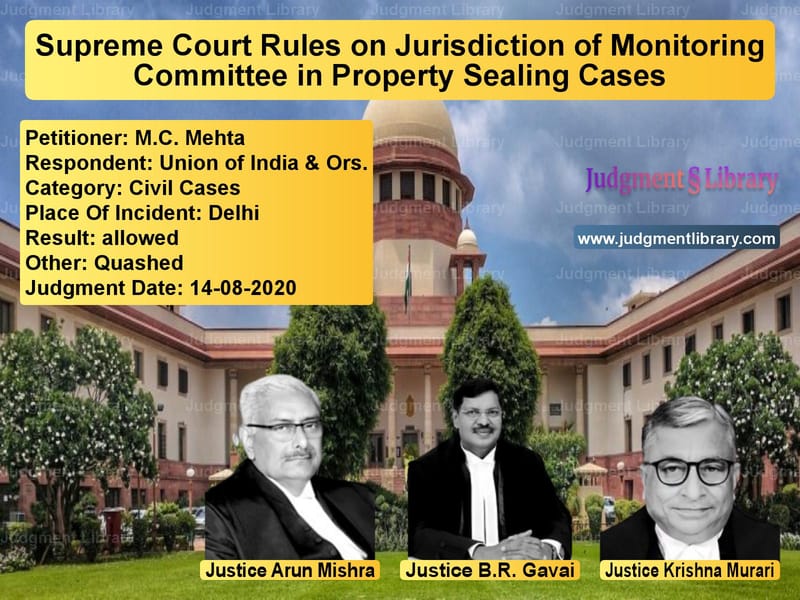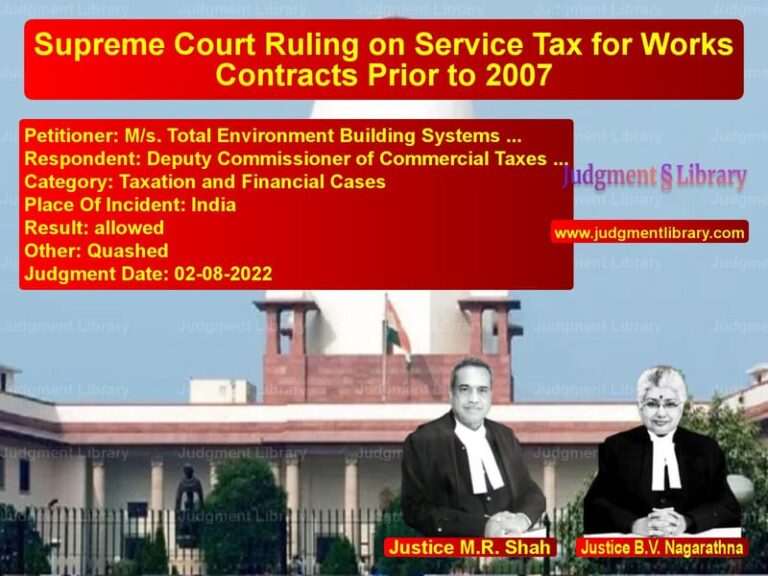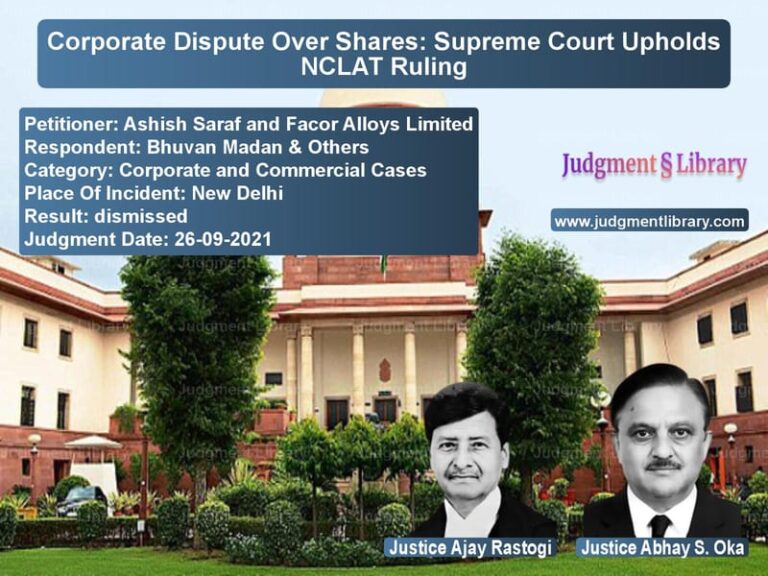Supreme Court Rules on Jurisdiction of Monitoring Committee in Property Sealing Cases
The case of M.C. Mehta vs. Union of India & Ors. is a landmark ruling addressing the powers of the Monitoring Committee in sealing unauthorized constructions in Delhi. The Supreme Court had to determine whether the Monitoring Committee, initially appointed for preventing misuse of residential properties for commercial purposes, had the authority to seal purely residential properties.
Background of the Case
In 2006, the Supreme Court appointed a Monitoring Committee to oversee and prevent the misuse of residential premises for commercial activities in Delhi. Over the years, the Committee expanded its scope and sealed various properties it deemed unauthorized constructions. However, several property owners challenged these actions, contending that their properties were purely residential and legally constructed under the Master Plan for Delhi 2021 (MPD-2021) and Low-Density Residential Area (LDRA) guidelines.
The Monitoring Committee’s actions, particularly in Vasant Kunj and Rajokari, led to significant controversy, with residents arguing that the Committee was exceeding its legal mandate. Report No.149 submitted by the Committee justified these sealing actions, prompting legal scrutiny and intervention by the Supreme Court.
Legal Issues Considered
- Whether the Monitoring Committee had the authority to seal residential premises that were not being misused for commercial purposes.
- Whether the Committee’s actions complied with the statutory framework of the Delhi Development Act, 1957, and the Delhi Municipal Corporation Act, 1957.
- Whether the principles of natural justice and due process were followed before sealing residential properties.
- The constitutional validity of the Monitoring Committee’s actions under Article 300A (Right to Property).
Arguments by the Petitioner (M.C. Mehta)
- The Monitoring Committee had exceeded its jurisdiction by sealing residential properties that were not being used for commercial purposes.
- The Master Plan for Delhi 2021 permitted certain constructions in low-density residential areas, and the Committee’s actions were contrary to this framework.
- The Monitoring Committee was acting beyond its original mandate, which was limited to preventing commercial misuse of residential premises.
- Residents were denied an opportunity to be heard before their properties were sealed, violating the principles of natural justice.
Arguments by the Respondent (Union of India & Others)
- The Monitoring Committee’s actions were justified as they were aimed at ensuring compliance with town planning laws.
- The properties in question had unauthorized constructions and, therefore, were subject to sealing.
- The Committee acted within the framework of the Supreme Court’s orders to regulate land use in Delhi.
- The principle of public interest required strict enforcement of land-use regulations to prevent unplanned urbanization.
Supreme Court’s Observations
The Supreme Court analyzed the constitutional and statutory framework governing property rights and urban planning. Key observations included:
- Jurisdiction of the Monitoring Committee: The Court held that the Committee’s role was limited to addressing the misuse of residential premises for commercial activities. It had no authority to act against purely residential properties.
- Statutory Safeguards: The Court emphasized that any action against unauthorized construction must comply with the due process prescribed under the Delhi Development Act and Delhi Municipal Corporation Act.
- Natural Justice: The Court found that residents were not given adequate notice or an opportunity to be heard before their properties were sealed.
- Article 300A: The Court reiterated that deprivation of property must be backed by legal authority and due process.
Final Judgment
The Supreme Court ruled in favor of the property owners and issued the following directives:
- The Monitoring Committee must restrict its actions to preventing commercial misuse of residential properties.
- Report No.149 and subsequent actions based on it were quashed.
- The sealed properties must be de-sealed immediately.
- Future actions by the Committee must comply with statutory requirements, including providing notice and an opportunity to be heard.
Implications of the Judgment
- Limits on the Monitoring Committee: The ruling clarifies that the Committee cannot exceed its legally defined mandate.
- Protection of Property Rights: The judgment reaffirms the principle that property rights are protected under the Constitution and cannot be arbitrarily taken away.
- Precedent for Future Cases: The ruling serves as a precedent for similar cases where quasi-judicial bodies act beyond their jurisdiction.
The ruling in M.C. Mehta vs. Union of India & Ors. is a significant affirmation of the constitutional protection of property rights, ensuring that regulatory bodies operate within the confines of the law.
Petitioner Name: M.C. Mehta.Respondent Name: Union of India & Ors..Judgment By: Justice Arun Mishra, Justice B.R. Gavai, Justice Krishna Murari.Place Of Incident: Delhi.Judgment Date: 14-08-2020.
Don’t miss out on the full details! Download the complete judgment in PDF format below and gain valuable insights instantly!
Download Judgment: M.C. Mehta vs Union of India & Ors Supreme Court of India Judgment Dated 14-08-2020.pdf
Direct Downlaod Judgment: Direct downlaod this Judgment
See all petitions in Property Disputes
See all petitions in Landlord-Tenant Disputes
See all petitions in Specific Performance
See all petitions in Damages and Compensation
See all petitions in Judgment by Arun Mishra
See all petitions in Judgment by B R Gavai
See all petitions in Judgment by Krishna Murari
See all petitions in allowed
See all petitions in Quashed
See all petitions in supreme court of India judgments August 2020
See all petitions in 2020 judgments
See all posts in Civil Cases Category
See all allowed petitions in Civil Cases Category
See all Dismissed petitions in Civil Cases Category
See all partially allowed petitions in Civil Cases Category







